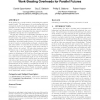Free Online Productivity Tools
i2Speak
i2Symbol
i2OCR
iTex2Img
iWeb2Print
iWeb2Shot
i2Type
iPdf2Split
iPdf2Merge
i2Bopomofo
i2Arabic
i2Style
i2Image
i2PDF
iLatex2Rtf
Sci2ools
SPAA
2009
ACM
2009
ACM
Beyond nested parallelism: tight bounds on work-stealing overheads for parallel futures
Work stealing is a popular method of scheduling fine-grained parallel tasks. The performance of work stealing has been extensively studied, both theoretically and empirically, but primarily for the restricted class of nested-parallel (or fully strict) computations. We extend this prior work by considering a broader class of programs that also supports pipelined parallelism through the use of parallel futures. Though the overhead of work-stealing schedulers is often quantified in terms of the number of steals, we show that a broader metric, the number of deviations, is a better way to quantify work-stealing overhead for less restrictive forms of parallelism, including parallel futures. For such parallelism, we prove bounds on work-stealing overheads--scheduler time and cache misses--as a function of the number of deviations. Deviations can occur, for example, when work is stolen or when a future is touched. We also show instances where deviations can occur independently of steals and t...
| Added | 25 Nov 2009 |
| Updated | 25 Nov 2009 |
| Type | Conference |
| Year | 2009 |
| Where | SPAA |
| Authors | Daniel Spoonhower, Guy E. Blelloch, Phillip B. Gibbons, Robert Harper |
Comments (0)

